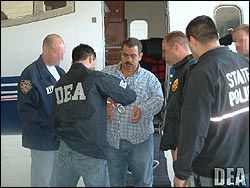DEA Raids Legal Marijuana Dispensaries In Seattle: Small Business Owners ‘Humiliated’ In Power Struggle Between State And Feds

The U.S. Drug Enforcement Administration (DEA) executed several search warrants for medical marijuana dispensaries in Washington state on Wednesday — even though sale and possession of marijuana, as well as its use for medicinal purposes, have been decriminalized and are regulated under the laws of the state.
The issue? While medical marijuana is legal in Washington, it is still illegal under federal law. "Marijuana is illegal 24 hours a day, 7 days a week under federal law," said Douglas Hiatt, criminal defense attorney. "There is no defense, there is no justification."
Hiatt is right. The battle between state governments and federal agencies over the legalization of marijuana has been like a tug of war.
On the one hand, you have the state lawmakers who are legalizing marijuana in an attempt to cater to their constituents' needs. More and more Americans are not only trying marijuana, but also support its legalization. In May, a survey published in the New England Journal of Medicine found that 76 percent of doctors would prescribe medical marijuana if necessary (and if it was legal). And earlier this month, even Israeli Rabbi Efraim Zalmanovich issued a religious ruling sanctifying the use of marijuana for medicinal purposes.
The federal government, though, has not been as receptive to marijuana's alleged health benefits — being especially insolvent about the legalization of its use for recreational purposes. Under the U.S. Controlled Substances Act, marijuana is not exempt from being an illegal controlled substance.
In May, Huffington Post reporter Ariel Shearer wrote that in lieu of high-profile raids that would take place in public view, the federal government was doing more discreet IRS targeting of marijuana dispensaries. The IRS was allegedly auditing marijuana dispensaries under an obscure portion of the U.S. tax code and, in some cases, landing marijuana dispensary operators in prison.
In the case of the DEA's crackdown in Washington, it doesn't seem to affect the state government as much as it affects the patients and business owners who rely on marijuana to survive. Leif O'Leary, a patient who uses marijuana for medical purposes, said that the federal government's raids impact people like him.
"You can't tell me there isn't bigger fish to fry, especially now that recreational marijuana is legal," said O'Leary. "It is just to me inconceivable that this is still happening."
The raid targeted dispensaries including the popular stores in the state like Seattle Cross, Tacoma Cross, and Bayside Collective. Casey Lee, who owns a clinic called Bayside Collective in Washington, echoed O'Leary's sentiments. He said that the federal government seizing about $2,500 of his store's medical marijuana not only affected his business, but was also "humiliating."
"One of the DEA agents said: 'This is your second raid and your third robbery. Why do you keep doing this?'" Lee said. "I just told him it's because we just enjoy helping people, and he told us that he wasn't expecting that answer."



























